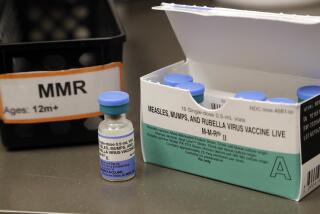State to Investigate Treatment of Baby With Flesh-Eating Disease
- Share via
NORTHRIDGE — State health officials said Wednesday they plan to investigate the case of Rosa Olvera, the 11-month-old Oxnard girl stricken by a flesh-eating bacteria, to determine whether she received proper medical care at Ventura County Medical Center.
The action was prompted by questions raised by the child’s grandmother and the hospital’s administrators about the delayed diagnosis and initial treatment of the potentially fatal disease, said Lana Pimbley of the state Department of Health Services.
“We will investigate,” said Pimbley, district manager of the licensure and certification office that is charged with investigating unusual deaths or cases at Ventura County medical facilities. “We plan to look into this.”
Hospital officials said Wednesday they had not been contacted about an investigation. But they said they are reviewing the care the child received on two separate visits to see if something could have been done sooner.
“Preliminary review shows that care given on both occasions was proper,” Dr. Richard Ashby, medical director of the county hospital.
Rosa remained in critical but stable condition Wednesday after undergoing two hours of surgery Tuesday evening at Northridge Hospital Medical Center, her doctors said.
Surgeons attached nearly a square foot of cadaver skin over Rosa’s right chest, side and back, covering an open wound left when surgeons removed strips of dead tissue ravaged by the bacteria. The skin grafts, designed to prevent deadly infection, are temporary and will be replaced with skin harvested from Rosa’s own scalp and buttocks in one to two weeks.
“She is still on a respirator but, hopefully, within the next 48 hours, she will be off life-support,” said Dr. Hooshang Semnani, head of pediatric critical care at Northridge Hospital, where Rosa was transferred Friday for the complicated procedure.
Rosa remained heavily sedated, but was able to open her eyes Wednesday and recognize her mother, Semnani said. Rosa’s parents, Miguel Olvera, 23, and Rosa Suarez, 20, declined to be interviewed Wednesday, but her maternal grandmother, Maria Suarez, 41, of Oxnard, said she and her daughter sought help from a number of doctors when they realized the baby was ill.
They took her to an Oxnard pediatrician whose name Suarez could not remember, who prescribed antibiotics and told the family that the baby appeared to be suffering from a minor throat problem.
Early June 30, when Rosa’s condition worsened, Suarez said the family took her to Ventura County Medical Center, where she was given Tylenol and Motrin and sent home at 5 a.m.
The next day, Suarez said, the baby’s condition appeared even worse. On the advice of friends, the family drove to see a doctor in Tijuana.
The Tijuana doctor told them that the baby was seriously ill and infected from top to bottom with something, Suarez said.
“He said it was a serious thing, and he wanted to keep her for more testing, but I told him, I can’t. We need to go back.”
The Tijuana doctor gave the baby an injection of antibiotics, and the family returned to Oxnard the same day.
About 5 p.m. Thursday, they took Rosa back to the Ventura County hospital after noticing that her belly was swelling.
“They said she was not doing well, that she was dying,” Suarez said. “That same night, they said they were going to take her to the other hospital.”
Suarez said she welcomed a state investigation, but added that the welfare of the baby is her primary concern.
“We took her to the hospital first, but we saw no improvements afterward, so we took her to some other doctors. She didn’t change. She was the same. Then she got worse.”
Pimbley said the state will investigate Rosa’s treatment because of reports that emergency room doctors did not detect the flesh-eating bacteria on the family’s first visit to the medical center.
On the baby’s second trip to the hospital, surgeons diagnosed necrotizing fasciitis, a rare and potentially fatal condition, and removed infected muscle, skin and fatty tissue from her chest, back and side, hoping to rid her body of the deadly bacteria.
Officials at Ventura County Medical Center said they are reviewing both visits to see if something could have been done sooner.
“Preliminary review shows that care given on both occasions was proper,” said Dr. Richard Ashby, medical director of the county hospital.
Before either of the two visits to Ventura County Medical Center, Ashby said, Rosa was examined by a family physician in Oxnard, who also failed to detect the flesh-eating bacteria.
Pimbley said her agency does not have jurisdiction over the Oxnard physician.
Dr. John M. Leedom, head of Infectious Diseases at the USC School of Medicine, said necrotizing fasciitis is extremely rare and very difficult to diagnose by physicians who are not experts in the field.
“It’s a very uncommon disease,” Leedom said. “Most doctors will go their whole careers and never see one case.”
Times staff writers Jose Cardenas and Hilary E. MacGregor contributed to this story.
More to Read
Sign up for Essential California
The most important California stories and recommendations in your inbox every morning.
You may occasionally receive promotional content from the Los Angeles Times.














